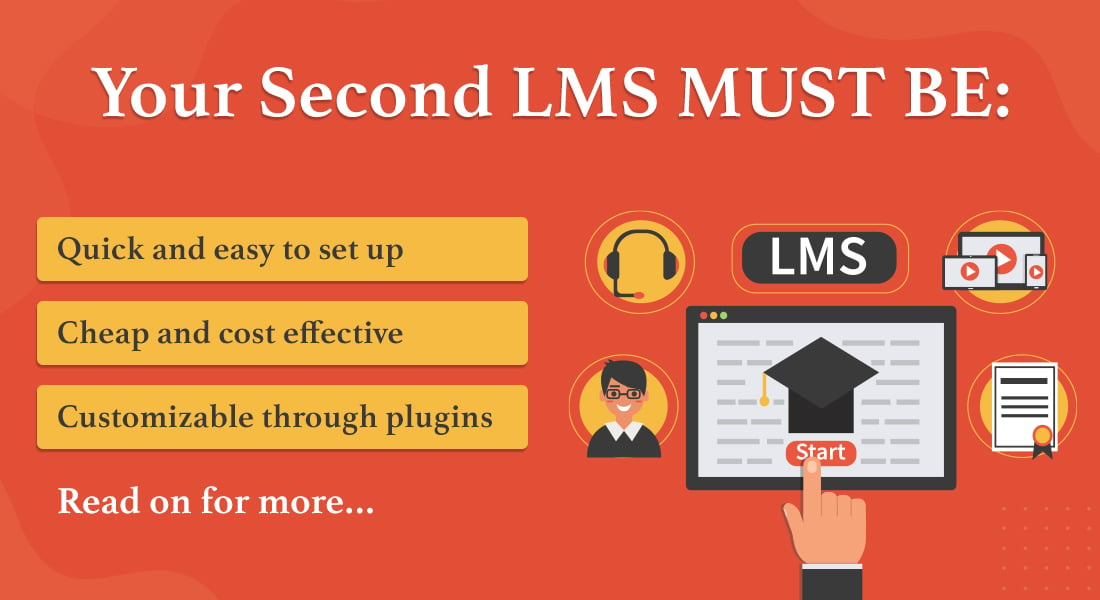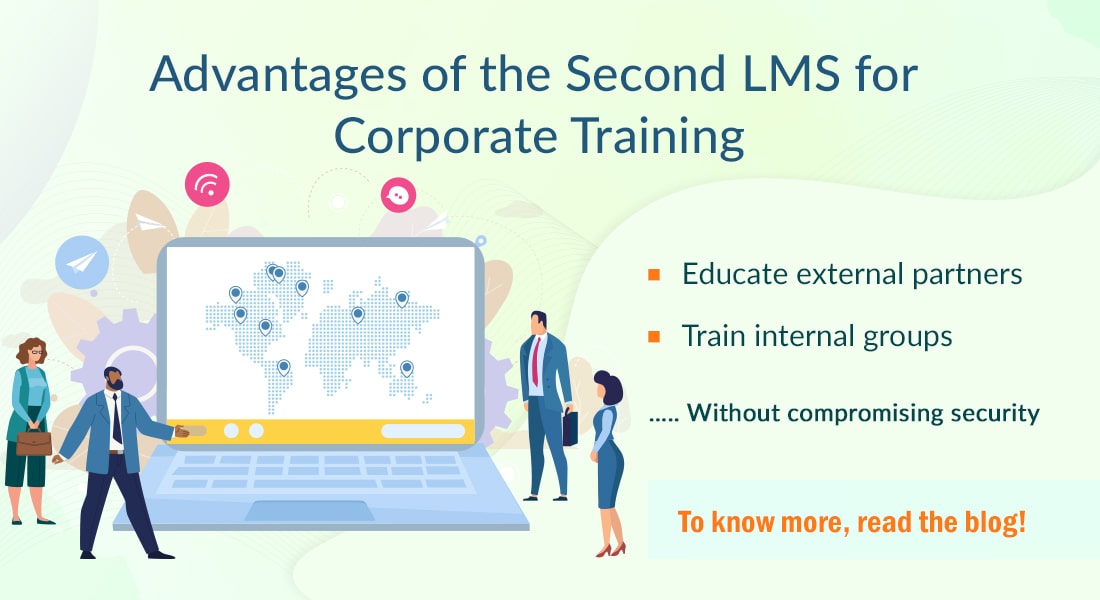Incredible Benefits of Customizing Your Learning Management System

Be it any organization or industry, all training and learning requirements constantly evolve. With almost all organizations using a learning management system, it is crucial that it is customized with the latest features to accommodate all the training and learning requirements. Customization not only makes an LMS reflect a company’s branding, but also gives organizations the ability to alter an LMS to perform specific functions according to their unique training requirements. An LMS that can be easily customized to fit specific needs is a no-brainer for any organization looking to add that extra punch to their online learning program.
From the outlook, it may seem that a customized LMS is only beneficial to the organization but that is not the case. As you will see, this blog will highlight the advantages that it offers LMS administrators and learners alike.
Here are the benefits of customizing an LMS for learners, administrators and organizations.
For Learners:
1. 24×7 Access to Learning Resources
For companies working on a global scale, ensuring that their online learning reaches all employees is a big challenge. A customized LMS is a big game-changer. E- learning courses hosted on an effectively deployed learning management system can be accessed by employees that are spread across geographies, without affecting the quality or consistency of training.
Most modern LMSs are responsive i.e., they are device-agnostic, and offer seamless, flexible learning experience on any device. This flexibility in-turn reduces dependency on a single mode of learning (i.e., desktop learning), and grants learners 24X7 access to the learning resources on multiple devices, whenever and wherever they need it.
2. Access To Different Training Resources
The corporate industry has been showing growing interest in mobile and video-based learning. Playing catch up with the industry requirements, an LMS today is not just limited to hosting e-learning modules. Customized LMSs today offer far more incentives than they did earlier, effectively integrating different types of training resources alongside e-learning. Learners don’t just have access to the usual formal training via their LMS, but also to other training resources such as videos, podcasts, eBooks, interactive PDFs essentially making it a cornucopia, a repository for all types of learning content.
Not only that, most modern learning management systems are gamified which enhance the learning experience. How? From awarding points and badges when completing certain activities, to leaderboards tracking and showing progress, all are integrated into the platform.
3. Increased Social Communication
Social learning and other collaboration tools have been known to constantly improve overall learner engagement and knowledge retention. A customized LMS offers the following channels for better socialization and communication among learners:
a. Live-chat functionality to better connect with peers and colleagues
b. Discussion groups to share ideas
c. Social media integration such as Twitter and Facebook widgets for learners to share their progress or achievements
d. Gamification badges and achievements to create a healthy competition among peers for better performance
4. Visual Dashboards of Training Activities
Visual dashboards on an LMS interface are a clever way of conveying the most important and relevant information. An effective LMS is one that not only lets users access training resources but also lets them keep a close eye on their performance.
Using dashboards, administrators can let learners know of their learning progress every time they log on to the LMS. This makes the LMS not just a passive repository hosting learning material, but also manages to be a more learner-centric platform in order to be truly effective. Other important information that a dashboard can display is training schedules, announcements, surveys, polls & responses etc.
For Administrators:
1. Bulk Course Uploads
For learners, an LMS provides tools for a variety of learner-centric activities such as online forums, videos, interactive quizzes. For an administrator, the advantages are varied. Adding 2-3 users to the LMS is not difficult but imagine the effort you have to put in to upload hundreds of courses. To add to that, learners belong to different departments in a company which means that different courses and their respective courses need to be uploaded. This is a cumbersome job, but one that can be easily solved using a customized LMS.
A customized LMS will provide the administrators with an option to upload bulk users, their respective courses and resources with just a few clicks. For example, an LMS administrator can easily import e-learning courses in bulk using a CSV (Comma Separated Values) file authored in either SCORM, Tin Can, or AICC format. Imagine if there are 100 e-learning courses to be hosted on the LMS platform, a single CSV file allows the administrator to upload all the 100 SCORM-based courses at a time, saving valuable time.
2. Assign Custom User Roles with Custom Access
A customized LMS allows administrators to easily assign custom roles and custom learning access to these roles. He/she is not confined to the default LMS user roles anymore. They can control the types of activities users are allowed to perform. For example, custom roles such as learner, trainer, assistant, LMS administrator, training manager can all be created with their own custom access.
For example, let’s say an organization is split into different departments as per a hierarchical structure. The LMS admin can assign similar courses in individual departments. He/she can clearly split and designate roles that allows them to manage users within the organization and department easily and accurately.
3. Send Customized Emails
Consider an organization that plans to impart training to 500 employees, and wishes to let the users know about their enrollment. It would be frustratingly tedious to send individual emails to all the 500 employees. But the LMS can be customized in such a way that whenever an administrator assigns a course to a particular user or bulk of users, the course enrolment email mail will be automatically sent to all the 500 employees without much effort.
4. Customized Reports to Calculate Training ROI
Generating customized reports is the most crucial feature of an LMS. Reports such as learner activity/progress, course overview reports, user-wise course completion reports, assessments/grades reports, course access time logs, certificate tracking give an administrator the power to constantly improve the online training strategy and personalize online training initiatives. A customized LMS, on the other hand, can help you generate custom reports, based on ad-hoc need/req. For example, you can generate a report User-wise Course Completion Report, or Course access time log report, and so on.
For Organizations:
1. Reduce Costs on Training Administration and Delivery
Having a single centralized location that stores and delivers the training to employees no matter what geographical location they are stationed at, is a huge plus for organizations in terms of cost-effectiveness. It helps cut down administrative exertion by allocating training resources, thereby allowing organizations to save hugely on the administrative and delivery costs.
2. LMS as a Powerful Evaluation Tool
As I mentioned earlier, the LMS generates different types of reports that provide organizations analytical data based on the learner statistics, which in turn helps in estimating the training program’s overall effectiveness. LMS reports can be powerful evaluation tools allowing companies to take crucial decisions like evaluating whether training is delivered on its objectives, what content is working with the learners, the duration of the course among others.
A learning management system is a powerful software application that allows organizations to take control of every aspect related to their training processes – from administering and publishing e-learning courses to tracking and reporting learner activity. A truly customized learning management system establishes a tight integration with your training strategy, tailored to your specific training needs. When selecting an LMS, make sure that it not only supports the features you need, but also provides you with intuitive administrative options to enhance training effectiveness.





